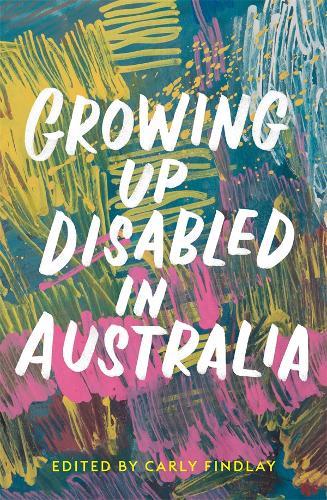
These stories range widely across different experiences of disability, and question why disabled people must always be the ones to adapt to the world.
In her introduction to this remarkable collection of personal essays, Carly Findlay writes that she didn’t identify as disabled until she was in her mid-twenties. It was while she was mentoring young people with chronic illness that she began to realise the common factors in serious lifelong medical conditions: long absences from education and work, and the impediments of ignorance or discrimination. These young people helped her to work through her internalised ableism and to be proud to embrace the label of disabled.
This is a theme that resonates through many of these stories. Findlay has been successful in her aim of providing a range of diverse experiences and a cohesive collection.
A brief endnote to the introduction explains the social model of disability, defined as ‘…the interaction between people living with impairments and an environment filled with physical, attitudinal, communication and social barriers’. To understand that is to better enjoy and understand the perspective of the authors.
I enjoyed the gentle humour of ‘Hippotherapy’ by Alistair Baldwin, which reads like an Ealing Studios comedy. Baldwin tells the tale of his horseriding experiences, teasing the reader about ‘the great incident’ that ended his obsession. The denouement is a comprehensive ride through the reader’s sensory reactions.
In ‘No Middle Ground’, Yvonne Fein, a manic depressive, intensely works through her family’s history of the Holocaust as she discusses her coping mechanisms, including the necessity to always take your meds. ‘So as soon as you are feeling better, the classic response is to throw the lithium away. That rarely has a positive outcome.’
I found both these pieces sublime.
The book provides a social history of disability in Australia, and has fascinating stories on the realities of surviving a world that demands the disabled adapt to the ‘normal’ – a euphemism for the abled.
‘I had become disabled – not just by my disease, but by the way the world treated me. When I found that out, everything changed.’ – El Gibbs in ‘Forever Fixing’
‘I didn’t grow up disabled; I grew up with a problem. A problem that those around me wanted to fix, and that I began to want to fix too.’ – Eliza Hull ‘Never Needed Fixing’
‘There is something about doctors and normality. Doctors are trained to identify abnormality and to problem-solve until it vaguely resembles their understanding of its reverse.’ – Sam Drummond ‘The Eleventh House’
These stories of the grind of hospital visits, operations, and everyday humiliations can be difficult to read, however their joy lies in the epiphany when the writer shifts from constantly adapting to others’ expectations to demanding the abled world adapt to them. For many of the writers this moment was also when they found their voice and followed their creative urges.
This is profoundly illustrated in ‘The Bedridden Astronaut’ by Melanie Rees, a speculative fiction author whose work has appeared in over a hundred publications. Enduring hospital stays, appointments and surgery and being hooked up to dialysis, she felt like an astronaut. She wrote a diary and puzzled over the meaning of 42 in The Hitchhiker’s Guide to the Galaxy and realised that she needed to write about what she wanted, not what made her unhappy.
The social model of disability has enabled people to understand that they are not the issue and to take pride in their individuality and their ‘non-normal’ body. The finding of community is a strong theme in many of the stories and delightfully expressed by Kit Kavanagh-Ryan in ‘Falling in Love, Fanfic and Bone Fusion’ as she falls in love with the woman with whom she exchanges stories. With comedic rudeness Olivia Muscat goes through the many daily incidents that impact on her in ‘Selected Epistles’. Educators take note! I also enjoyed ‘Born Special’ by Kath Duncan, which reads like an eighties family saga authored by Abbie Hoffman. Duncan takes pride in being a freak and thinking like one.
Poetry is also a feature of this collection: ‘Lady Lazarus’ by Carly-Jay Metcalfe, inspired by Sylvia Plath’s poem, is an earthy rumination on dying, and Jessica Walton’s delightful ‘Curve’, with its theme of struggle and acceptance, closes the book.
Growing Up Disabled In Australia is the latest in this series from Black Inc., which introduces us to alternative or silenced voices in this country. I found the quality of the writing particularly strong in this appealing collection of memoirs.
Carly Findlay refers to the late Stella Young, who edited the ABC’s Ramp Up, and laments the absence of a current dedicated platform for Australian disability writing. There were 360 stories submitted for this collection. I hope those that did not get published can find an home online.
Carly Findlay (ed.) Growing Up Disabled in Australia Black Inc. 2021 PB 320pp $29.99
Michael Jongen is a librarian who tweets as @michael_jongen
You can buy Growing Up Disabled in Australia from Abbey’s at a 10% discount by quoting the promotion code NEWTOWNREVIEW here or you can buy it from Booktopia here.
To see if it is available from Newtown Library, click here.
Tags: Alistair | Baldwin, Australian writers, Carly | Findlay, chronic illness, Eliza | Hull, Jessica | Walton, Kath | Duncan, Kit | Kavanagh-Ryan, Melanie | Rees, Olivia | Muscat, people with disability, Sam | Drummond, Stella | Young, Yvonne | Fein
Discover more from Newtown Review of Books
Subscribe to get the latest posts sent to your email.






